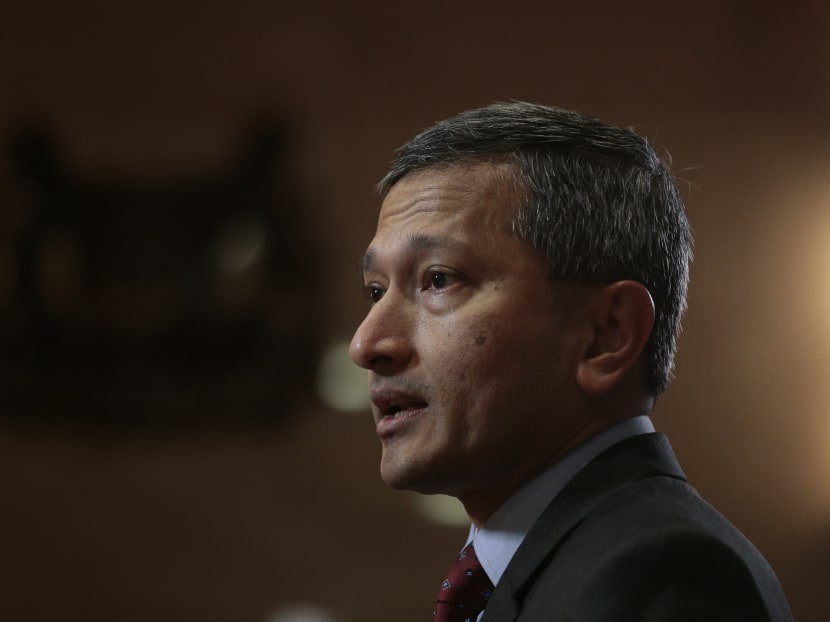Countries must double down on free trade despite ‘ruptured’ consensus on its benefits: Vivian
SINGAPORE — While globalisation has resulted in “winners and losers” around the world, countries must continue to pursue free trade and economic integration to reap the benefits of changing economic conditions globally, said Minister for Foreign Affairs Vivian Balakrishnan on Friday (March 23).

While globalisation has resulted in “winners and losers” around the world, countries must continue to pursue free trade and economic integration to reap the benefits of changing economic conditions globally, said Minister for Foreign Affairs Vivian Balakrishnan on Friday (March 23). TODAY file photo
SINGAPORE — While globalisation has resulted in “winners and losers” around the world, countries must continue to pursue free trade and economic integration to reap the benefits of changing economic conditions globally, said Minister for Foreign Affairs Vivian Balakrishnan on Friday (March 23).
In particular, small countries like Singapore — where trade volume totals up to three-and-a-half times Global Domestic Product — must remain committed to free trade, a system which has helped led many Asian countries into prosperity, said Dr Balakrishnan, who was speaking at a dinner for the Trilateral Commission’s annual plenary meeting.
“In Singapore, when we say we stand for free trade, it’s not a debating point. It is our lifeblood. Because we are small, by definition, we also have to believe in an open, inclusive, and rules-based multilateral trading system,” he said.
Political leaders should recognise that free trade has led to inequalities within and among nations — exacerbated by the new digital revolution — but these must not prevent them from pursuing a liberal trade agenda, the minister urged.
“Global consensus on the benefits of free trade has been ruptured… We should not be surprised when we face the voters to see an increasingly unsettled, sometimes disgruntled, vocal population, who are demanding a more equitable share of economic gain,” said Dr Balakrishnan, noting that the prevailing political climate has made trade liberalisation “unfashionable”.
“And in the face of such disaffection, free trade has become an easy scapegoat,” he noted.
Singapore will continue to stay the course in pursuing an open and inclusive trade agenda, he stressed, noting that trade liberalisation has been a formula for peace and prosperity.
Fears of trade wars have spiked. Hours earlier, the Trump administration said it would slap tariffs on some US$60 billion (S$78.8 billion) worth of Chinese goods to combat the rising threat from a nation that the White House has called “an economic enemy”. Beijing threatened reciprocal tariffs on US$3 billion of imports from the United States.
Dr Balakrishnan said: “I believe, we believe, we need to stay the course. We think that unilateral actions, and the fact that they may elicit a counter-reaction, a tit-for-tat. We think trade wars are a very bad idea.”
“We need to avoid measures that ultimately would inflict pain on ourselves, will lead other countries to retaliate, and undo the formula.”
Urging countries not to “lose their nerve” on free trade, he added: “We need to make changes where they are necessary. We need to prepare our people for an enormous, exciting ride ahead, but we also need to double down on free trade (and) economic integration.”
Turning to multilateral institutions, Dr Balakrishnan said many countries have benefitted from the “rules-based, open and inclusive global architecture” prompted primarily by the US. In fact, China has been the “biggest winner” as it managed to lift some 800 million people out of poverty over the past few decades, he added.
But countries need to relook political, economic and social institutions which were created since the last industrial revolution, said the minister.
With changes in the global economic influences — such as a shift of the “economic centre of gravity” towards Asia — multilateral financial institutions like the World Bank and International Monetary Fund (IMF) must also evolve, he said.
Asia has traditionally been “underweighted” in these institutions, he noted. “These institutions made a difference, but, and here I have to be slightly undiplomatic. The World Bank and IMF was very much underweighted, as much as Asia is concerned, especially for China, as well as India,” he said.
“It was only in January 2016 that the IMF increased China’s vote share to 6 per cent. It reduced the American vote share from something like 16.7 to 16.5 per cent. But where was the proportionality before?”
He added: “We should not have been surprised, therefore that China proposed the AIIB (Asian Infrastructure Investment Bank).”
States will be better off overall with multilateral institutions could be reformed to accommodate various participants and offer each “a sense of fairness”, he said.
“My point is, if these multilateral institutions do not accommodate the new, dynamic changes in reality. Then alternatives will be created… And rules, even if they have to be rewritten, should be rewritten in a consensual, multilateral way. And not on the basis that might is right, or ‘I am bigger than you’,” he said.
Formed in 1973, the Trilateral Commission is a non-governmental, policy-oriented forum that aims to find solutions to major geopolitical, economic and social challenges. Its annual Plenary Meeting gathers over 200 political, business, academic and civil society leaders from Europe, North America and Asia Pacific.
*CLARIFICATION: In an earlier version of this story, Foreign Minister Vivian Balakrishnan had been reported as saying that the International Monetary Fund (IMF) had increased China’s vote share to 6 per cent in December 2015. The Ministry of Foreign Affairs has since clarified that China's vote share was increased in January 2016.






